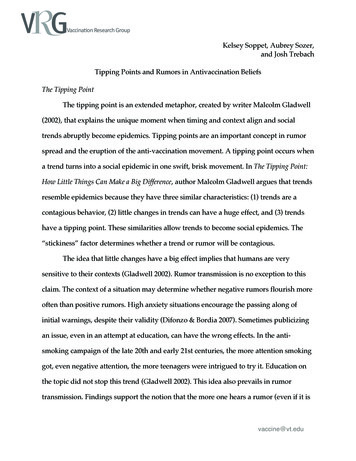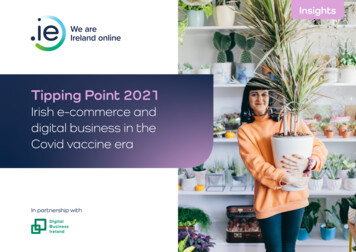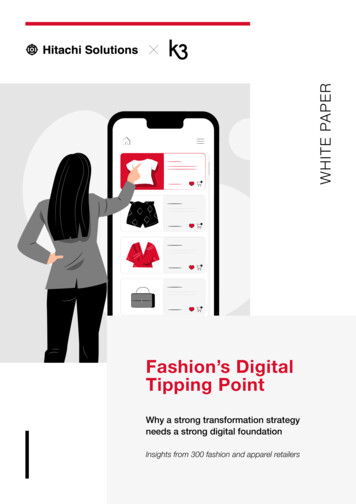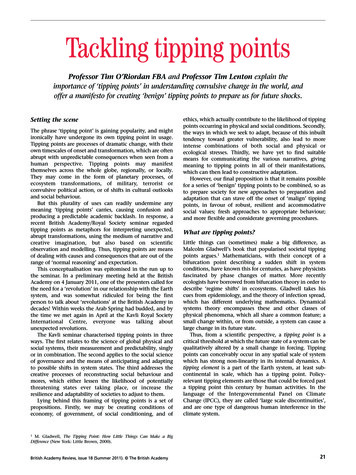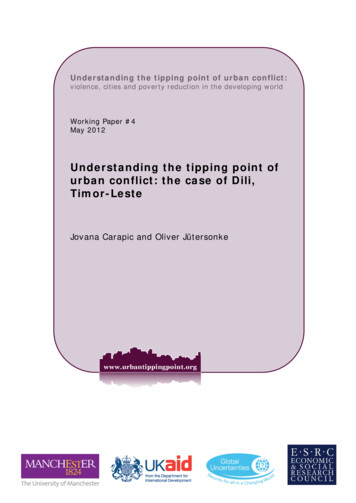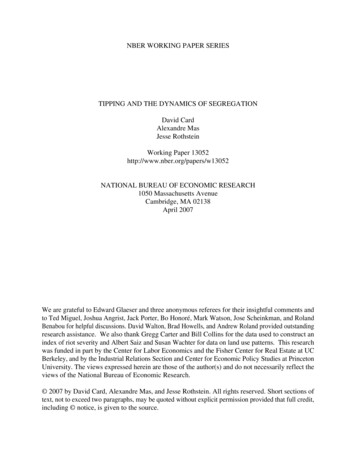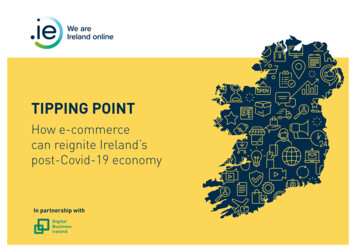
Transcription
TIPPING POINTHow e-commercecan reignite Ireland’spost-Covid-19 economyIn partnership withDigitalBusinessIrelandDigitalBusinessIreland
ForewordContentsThe Covid-19 crisis has been a tipping point for Ireland for many reasons. As a nation, we have endured monthsof isolation and a suspension of the natural order of things. Many of us have lost loved ones. Thousands of businesseshave closed, unemployment has soared, and uncertainty prevails.2Key findings3Insights4Section 1:E-commerce in Irelandbefore Covid-19Another Covid-19-induced tipping point has more positivelong-term ramifications for Ireland’s economy. In this report,we have recorded a swing in online retail sales to Irish SMEs,away from their historically dominant international competitors.This is a significant milestone.6Section 2:The consumer responseto Covid-198Section 3:The SME responseto Covid-1910Section 4:E-commerce in postCovid-19 Ireland12Methodology and AboutThe Covid-19 crisis has encouraged consumers to look closerto home for goods and services. While perceptions of quality andtrust have played important roles in this, a major proportion of theconsumers we spoke to said that they simply wanted to supportIrish businesses through a challenging period.However, a swing of this nature is not necessarily a permanentone. It is entirely possible that once the economy returns ‘tonormal’, and businesses are no longer experiencing restrictedtrading, Irish consumers will not feel the need to be as supportiveas they have been. They may also return to buying frominternational retailers, which they still regard as cheaper andbetter stocked, with superior online storefronts and services.On the latter point, Irish SMEs are still far behind; as many as80% have invested no money whatsoever in their online servicessince the Covid-19 crisis began.Irish consumers are spending more online with Irish SMEs thathave pivoted to help save their businesses during the lockdown.We need to press the advantage and ensure this is not short-lived.So far the signs are good for this omni-channel approach.Acknowledging the significant allocation of government fundingsecured by business groups for the recovery of Ireland’s SMEsectors, it is important to ensure that finance is dedicated toinvestment in digital tools and digital skills for SMEs. Properlyequipped to meet consumer demand, small businesses can playa major role in reigniting Ireland’s post-Covid-19 economy.Recent events inform us that never before has the need fora digital business model been more acute. As Covid-19 engulfsour world, it has brought to the fore the pressing need for anomni-channel, bricks-and-clicks approach to business, a factthat is corroborated by stratospheric online retail sales figuresover the past number of months. Interestingly, the pandemicsignified a major shift in Irish consumer shopping habits as theyopted to support home-grown businesses, which demonstratesan economically conscious shopper. Whether this behaviouralpattern will be sustained depends on the investment of Irishbusinesses in their online offering.While an integrated, omni-channel business model mustbecome an elevated priority in order to offset the threat of areturn to a leak in spend to international businesses, furtherefforts will have to be made to bridge the digital divide.The complexities of such challenges require a multi-dimensionalresponse. Personalisation, AI, flexible payment options, fasterdelivery times, and seamless customer journeys will be a keyfocus for discerning e-tailers, who must seek out opportunitiesto differentiate themselves in a busy online marketplace. On amacro-level, the timely delivery of the National Broadband Planand further take-up of the Digital Trading Online Voucher willhelp us become a leading digital economy.However, getting the fundamentals right will be crucial. Thehuman resource requirements of many businesses will change,and having a suitably trained talent-pool to reflect the changingemployment needs will be key as we enter a new era.Lorraine HigginsCHIEF EXECUTIVE, DIGITAL BUSINESS IRELANDDavid CurtinCHIEF EXECUTIVE, .IE1
Key findingsThe .IE Tipping Point survey assessed the attitudes and responses to the Covid-19 crisis of 1,000 Irish consumers and 500 retail and customer-facingprofessional services SMEs. We looked at three distinct phases: before the crisis, during it, and intended behaviour after the crisis is controlled.Here are some key data points that we believe will help business groups and government decision-makers understand how digitalisation canreignite Ireland’s economy:123472% of consumers53% of consumers’ online spend67% of consumers48% of consumershave either spent more online duringthe Covid-19 crisis or the same amountas before.since the Covid-19 crisis has beenwith Irish SMEs.who have done most of their onlineshopping with Irish businesses say theyhave done so out of a sense of solidarity.would still do most of their shopping in physicalstores if Covid-19 were under control and socialdistancing were not required.This may indicate that Irish SMEs arecurrently riding a temporary wave ofnational goodwill.The other half would either shop in-store onlyfor necessities; or shop mostly online. Thisunderscores the need for SMEs to provide anomni-channel experience.95% of all consumers shop onlineat least some of the time. Generallyspeaking, Covid-19 has done littleto dampen this demand.International retailers have historicallydominated Irish e-commerce.5678Just 25% of SMEs79% of SMEs46% of SMEs53% of SMEssell online.with websites have investednothing in their online servicesduring the Covid-19 crisis.that have invested in online servicesduring the Covid-19 crisis are busierthan or as busy as before.believe that consumers will buy in-storeand online after the Covid-19 crisis.63% of those who did invest saidit was easy but they requiredsome form of outside help.Investing in online creates moreways to generate revenue andconnect with customers.This is despite the huge amount ofmoney being spent online by Irishconsumers before and during theCovid-19 crisis.SMEs’ opinions are aligned with consumersentiment. There is an understanding ofomni-channel among SMEs, but just aquarter of them sell online.2
InsightsBy consolidating the new learnings of the .IE Tipping Point report with the findings of other Covid-19-related surveys, we have developed insights that showhow the digital and e-commerce landscape in Ireland is changing and what that means for SMEs and the organisations and Government departments thatrepresent them: 123Solidarity and support for local businessTectonic plates are shifting – fasterDigital investment pays offSolidarity and support for Irish businesses may neverbe stronger. To turn the positive sentiment into sales,Irish businesses must dial up their online competitiveadvantages of trust, reliability, and solidarity when theirwebsites are competing with online international sellers.Irish consumers perceive that local SMEs lag on priceand product range.We are moving from a face-to-face, person-to-personeconomy to a delivery economy. Covid-19 has beenthe catalyst, accelerating changes already in motion.In a difficult period for many SMEs, those that haveinvested in their digital and online presence havereaped the rewards at a time when other businessesare struggling.456Government finance can act as an accelerantSpending more online, but keen to get backin-storeThe ongoing legacy of the pandemicGovernment financing is now available on a massivescale to help SME recovery. Representative organisations,having secured the funding, now need to advocate toensure that SME projects include digitalisation andinitiatives to modernise and digitise SMEs’ sales processes.Digital tools can improve SMEs’ productivity andcompetitiveness. Digital marketing can boost salesand cashflow.The Covid-19 experience has changed consumers’shopping habits for good. Those businesses thinking thatthis is a temporary blip are mistaken. For SMEs, gettingonline used to be a very slow process – now it’s onlytaking weeks.While there is a consumer desire for in-store experience,the ‘new normal’ is still evolving. We are not yet postCovid-19. Social distancing means ongoing queues andcustomer limits, which may be off-putting for consumers.An online sales channel will be important to capitaliseon consumers who turn away from physical stores if theysee a queue.Although its easy for some SMEs, most SMEs who investneed some assistance with selection and installation ofdigital tools.Work from home, shop from home, entertain at home:city centres are hollowed out as fewer workers commuteon public transport. This will represent an opportunityfor towns to reinvigorate themselves.Services can be delivered online too. Covid-19 has brokenthe mould and proven that medical consultations, gymclasses, and legal appointments can all be done successfullyover online platforms, such as Zoom and Teams.3
Section 1Before the Covid-19 crisis,consumers estimated that E-commerce in Ireland before Covid-19Before the Covid-19 crisis, 48% of Irish consumers’ online purchases were with Irish SMEs. That spend isexpected to grow. Now is the time for Irish SMEs to make sure their websites are easy to use, mobile friendly,and can facilitate payments.E-commerce is worth a great deal to the Irish economy. The Central Bank estimates that Irish consumersand businesses spent 16 billion online in 20191, a figure that has risen consistently over the last decade.Irish consumers are eager to spend on the internet: 95% of our survey respondents say that they shop online,82% either frequently or at least some of the time. The cohort that does all its shopping offline is now part of ashrinking minority.48%Despite Irish consumers’ willingness to spend, the majority of their money has historically gone abroadto international retailers, which are viewed favourably because of their lower price points, larger ranges ofproducts, and more intuitive, better designed websites and online storefronts. Indeed, in many business sectors,international retailers are the only ones with online stores.of their online purchaseswere with Irish SMEsversusIrish consumer online spending habitsDo you shop online?If yes, how frequently?(Base: 1,000 consumers)(Base: 950 consumers who shop online)5%RarelyNo18%52%45%Sometimes95%1Central Bank Annual Report 2019YesFrequently37%with internationalretailers(Base: 1,000 consumers)4
Section 1 E-commerce in Ireland before Covid-19 [continued]Examining the status quoConsumer preferenceE-commerce starts with an onlinepresence. SMEs need to be visible,and that requires having a websiteor social media page, preferably both.Just because 95% of consumers shoponline, it doesn’t mean that they nevershop in-store. In fact, most consumerswant the “omni-channel experience”,where their shopping needs aremet by a seamless combination oftraditional main street retail, online,and e-commerce.Two-thirds of Irish retail and customerfacing professional services SMEshave a website, a figure that risesto more than three-quarters (76%)among businesses with more thansix employees.Websites are highly valued by thebusinesses that have them. The vastmajority (90%) see their website asimportant in driving awareness of theirbusiness; 77% see it as important ingenerating sales in some way; and64% see the website as an importantpoint of transaction, where salescan be captured and processed.However, most Irish SMEs stop theirdigital journey here. Even thoughonline spending is the norm amongIrish consumers, very few Irish SMEsactually sell to them.Our research shows that just 25% ofSMEs sell online, which implies thatthe other three-quarters rely entirelyon physical, in-person sales.SMEs that are flexible enough tofacilitate both will attract morecustomers and be able to bettercompete with international retailers.66%76%OF ALL IRISH RETAILAND CUSTOMER-FACINGPROFESSIONAL SERVICESSMEs HAVE A WEBSITE.THIS FIGURE RISES TO 76%AMONG SMEs WITH MORETHAN SIX EMPLOYEES.(Base: 500 SMEs)While Covid-19 has for now made manyconsumers wary of in-store shopping,findings in Section 2 suggest that mostanticipate a blended routine when itis safe to do so.The importance of a websiteJust 25%of Irish retail and customerfacing professional servicesSMEs sell online(Base: 329 SMEs with a website)90%77%64%of SMEs say their websitedrives awareness of theirbusinessof SMEs say their websitehelps to generate salesof SMEs say their websiteis important as a point oftransaction to capture andprocess sales(Base: 500 SMEs)5
Section 2Since the Covid-19 crisis,consumers estimate that The consumer response to Covid-19Despite economic collapse since the lockdown, with most of Ireland’s main street shops and office spaces closedfor business, consumer demand online has continued unabated. Since the Covid-19 crisis began, almost half(49%) of consumers say they have spent more money online than before the pandemic, while just over a quarter(26%) have spent the same as before. Increases in online spending occurred mostly in the younger age group of24-34 year olds (58%), many of whom may have frequently shopped online for goods and services pre-Covid-19.Typically, international businesses are the first ones to benefit from any increases in Irish consumers’ onlinespending, but the Covid-19 crisis has been different. Consumers estimate that since the Covid-19 crisis beganin March, 53% of their online purchases have been made with Irish businesses compared to 48% before.While the percentage change is not huge, it is still a significant milestone—previous research has shownthat the bulk of Ireland’s e-commerce spend has gone abroad to international retailers.Covid-19 and the lockdown have been major contributing factors. Irish consumers know that without theirsupport, many Irish businesses will never reopen. Buying Irish has always mattered to Irish consumers, butCovid-19 has created a sense of urgency. Over two-thirds (67%) of consumers who had done most of their onlineshopping with Irish businesses explicitly stated that they wanted to help Irish SMEs through the crisis.Have consumersbeen spendingmore or less onlinesince the Covid-19crisis began?(Base: 950 consumerswho shop online)Not spending onlineSignificantly lessA little lessThe same10%4%17%of their online purchaseshave been with Irish SMEsversusSignificantly more47%12%26%53%32%A little morewith international retailers.(Base: 1,000 consumers)6
Section 2 The consumer response to Covid-19 [continued]Other factors have played an importantrole. Online Irish businesses areseen as faster and more reliable thaninternational businesses (48% vs 24%),and more trustworthy (41% vs 12%).support businesses at home when abetter online experience is availableelsewhere.On the internet, credit card scams,identity theft, and cybersecuritybreaches are frequent. Withoutface-to-face, physical interaction atthe checkout, online stores need toprove to consumers that they canbe trusted to carry out a transactionin good faith.Nearly every consumer we surveyed(95%) said it has been important tothem to support their local smallbusinesses during the Covid-19 crisis.68% had purchased from their localbusiness’s physical shop, wherepossible; 43% had referred the businessto a friend; and 41% had purchasedfrom their local business’s online store.Many Irish businesses use secure .iedomains for that reason. All .ie domainregistrations are manually reviewed toensure that the website owners have avalid, certifiable connection to Ireland.Where international businesses doconvincingly win out are on affordability(71% vs 11%) and range of products(69% vs 13%). More consumers saidthey preferred international businesses’websites and online storefronts (34%vs 11%).This finding is a red flag. While Covid-19may have encouraged Irish shoppersto turn their present attention to Irishbusinesses, once the virus is controlledand the economy returns to normal,they may no longer feel obliged toCovid experiencesThere are signs that some of theCovid-19-inspired e-commerce changesare permanent. In many industries,the percentage of consumers who saythey will shop online with Irish retailersover international retailers after theCovid-19 crisis is higher.For example, 29% say they will buyelectronics and appliances from Irishbusinesses vs 26% from international.In a particularly interesting shift, 34%of consumers say they will purchaseclothing and shoes from Irish SMEsin the future. While the figure is thesame for international retailers, it isa noteworthy gain by Irish SMEs in asector dominated by large brands.Why consumers have chosen to shop online primarily withIrish or international businesses during the Covid-19 crisis(Base: Consumers who had chosen to shop primarily with Irish (437) and international(340) businesses)Want to support them during the crisisCheaperBetter range of productsBetter online services/storefrontsMore trustworthyMore reliableBetter delivery 1%69%34%12%24%25%How consumers have helped their local small businessduring the Covid-19 crisis(Base: 950 consumers who said supporting their local business was important)68%43%41%28%13%PURCHASED FROMTHEM IN-STORE,WHERE POSSIBLETOLD FRIENDSAND FAMILYABOUT THEMPURCHASEDPRODUCTS FROMTHEM ONLINESHARED SOCIALMEDIA POSTSOR LINKSPURCHASEDVOUCHERS FORLATER USE7
Section 3The SME response to Covid-19In Section 1, we learnt that only a quarter of Irish SMEs have any ability to sell online. Despite beinghamstrung in this way, especially during a period in which most bricks-and-mortar shops have beenclosed for a prolonged period of time, Irish SMEs have enjoyed public support, including in the formof spending.21%This rise in national solidarity may have temporarily allowed SMEs to benefit despite their lackof investment in digital and e-commerce. Our research shows that almost 80% of all SMEs haveinvested no money at all in online services since the Covid-19 crisis began, despite the fact thatthere were consumers actively seeking them out as the results in Section 2 show.of SMEs have invested intheir online presence sincethe Covid-19 crisis beganAmong the 80% that have not invested since the Covid-19 crisis, 46% said that online simply isn’t apriority for them, a figure that rises to over half among SMEs with five or fewer employees. Perhapsthis is understandable given that we are in the throes of a global pandemic. 14% said that they havemanaged to do the majority of their business in-store despite the lockdown, while 12% have divertedmoney that might otherwise have gone to digital to cover wages and bills.Public sentiment is highly changeable. What currently benefits SMEs may not benefit them in threemonths, six months, or a year. A robust e-commerce strategy must be built on solid, competitiveonline services that meet consumer demand.Why SMEs haven’t investedin their online presence(Base: 400 SMEs thathave not invested in theironline presence sincethe Covid-19 crisis)23%46%OtherOnline isn’ta priority12%We have divertedmoney to wages,bills etcMost of our businesshas been done in-storeAn investment ofup to 500was most common(Base: 500 SMEs)14%22%Already doingall we can8
Section 3 The SME response to Covid-19 [continued]The benefits of online investmentNet returnsAmong the SMEs that have investedmore than usual in their online services,67% said the money has gone towards aredesigned or significantly updatedwebsite, while 59% launched or improvedtheir online store with either click-andcollect or direct-to-door delivery.When SMEs were asked if they hadnoticed any positive changes in terms ofsales or customer enquiries as a result oftheir online services investment, almosthalf (46%) said they had, and this hadeither made them busier than before theCovid-19 crisis began or similarly busy.Over half have experienced a change invisitor numbers to their website since theCovid-19 crisis began; of that proportion,77% have noticed an increase. A third ofSMEs with a website say they don’t knowor don’t know how to check.Almost half of all SMEs made use ofonline/mobile software to maintainrelationships with existing/prospectivecustomers. 31% of these SMEs reporttheir customer relationships are betterthan usual.Among the quarter of SMEs that haveonline sales capability, 88% have noticed achange in their volume of sales since theCovid-19 crisis began; 77% say this hasbeen a positive change. Of that number,over a third (37%) have noted an increaseof more than 25%.However, many SMEs are still strugglingto deploy their online services. Over athird said the process had been difficult,while 63% said it was easy, but theyrequired some kind of outside help.37%of SMEs that noticed achange to their salesrecorded an increaseof 25% or more(Base: 111 SMEs that noticed an increase/decrease in sales from their online store)Billions of euros of Government finance isnow available to help SMEs recover fromthe pandemic. Clearly, resources shouldbe applied to help build digital capabilitiesfor SMEs that are motivated to invest inonline services.Has online investment translated into increased salesand customer enquiries?(Base: 100 SMEs that invested in online services since Covid-19 crisis began)21%YES, BUSIERTHAN BEFORETHE COVID-19CRISIS25%19%YES, MAINTAINING YES, ALTHOUGHA SIMILAR LEVELBUSINESS STILLOF BUSINESS ASSTRUGGLINGBEFORE THE CRISIS16%19%NO, NOTNOTICED ANYDIFFERENCEDON’T KNOWSME perception of difficulty pivoting towardsonline services(Base: 100 SMEs that invested in online services since Covid-19 crisis began)33%25%5%Easy but requiredexpert helpEasy and requiredlittle timeEasy but required helpof industry colleague23%14%Difficult and requiredexpert helpDifficult and requiredsignificant time investment9
Section 4E-commerce in post-Covid-19 IrelandAll currently available data suggests that Covid-19 will be with us for the foreseeable future. Until an effective treatmentor vaccine is found, consumers and employees are likely to be engaged in some form of social distancing, and businesseswill continue to experience restricted trading while managing employees who are working from home.The question that many businesses and government bodies are asking now is whether the behavioural changesconsumers have undergone during the lockdown, such as their increased propensity to spend online with Irish businesses,will continue when the Covid-19 pandemic ends.Consumers will only return to physical stores in confidence if and when Covid-19 has been deemed controlled and socialdistancing is no longer required. In this future scenario, almost half (48%) of all Irish consumers say they would do most oftheir shopping in physical stores. The remaining 52% would either continue to shop in-store for necessities, like groceries,but online for other goods; or do all their shopping online.Until Covid-19 is controlled, however, social distancing, queues, and capacity limits are here to stay. Consumers areaware of this, and online shopping offers them a way to avoid inconvenience and crowds. Just under three-quarters (74%)say that current restrictions will impact their decision to shop in physical stores to some degree.Why consumers would preferto shop mostly in-storeWhy consumers would preferto shop mostly online(Base: 480 consumers who would choose toshop mostly in physical stores in ideal scenario)(Base: 110 consumers who would chooseto shop mostly online in ideal scenario)MoreconvenientWant to gooutside/be social62%Safer/requiresless interaction59%55%Saves time56%Saves time24%Moreconvenient51%Local/preferredretailer not online21%Requiresless travel50%Cheaper14%Cheaper29%Reflecting the psychologicaltoll of lockdown and the desireto go outside and be social,once Covid-19 is controlled.48%of consumerswould still do mostof their shoppingin physical stores41%would shop fornecessities inphysical stores but shopfor the rest online and11%would shopmostly online(Base: 1,000 consumers)10
Section 4 E-commerce in post-Covid-19 Ireland [continued]How SMEs believe consumers’ long-term shoppinghabits will change as a result of Covid-19(Base: 500 SMEs)The omni-channel futureBusinesses that reopen their physicalstores are required to meet new publicsafety requirements, such as theprovision of protective screens andhealth information signage. This canrequire significant upfront expenditure,and will mean reduced capacity instore, with smaller margins for physicalstores. Digital offers the opportunityto grow and scale and complement instore sales.Combined with Irish consumers’willingness to spend more online,these factors may be affecting SMEs’long-term plans. 54% say they willprioritise their online store or giveequal importance to both. Fewer thanhalf (45%) of SMEs that invested inonline services during the crisis saythey will be prioritising their physicalstore over online in the future.53% of SMEs predict that consumerswill buy from both physical bricksand-mortar stores and online stores,which suggests that the importanceof omni-channel retail is increasinglyunderstood by small businesses.Click and collect, order online beforeyou arrive, order online to cook athome, browse at home to purchasein-store – these trends are accelerating.However, when only a quarter of SMEssell online, few of these businesseswill actually be in a position to fullysatisfy their customers’ needs, unlessthey invest in e-commerce now whenGovernment funding is readily available.The same can be said for deliveringservices online.97% will continue to invest in onlineservices after the crisis; 59% say thiswill become a major priority.97%of SMEs that have spent on online services sincethe crisis will continue to invest in them in the future(Base: 100 SMEs that have invested in online since Covid-19 crisis)24%53%23%THEY WILLPREFER TO BUYMORE PRODUCTSONLINETHEY WILLBUY IN BOTHTHEY WILLPREFER TO BUYMORE PRODUCTSIN-STOREHow social distancing and capacity limits impactconsumers’ decision to shop in-store(Base: 1,000 consumers)12%Far less likely to shop in allphysical stores apart fromthose selling necessities15%26%12%26%15%Somewhat less likely to shop inall physical stores apart fromthose selling necessities22%Far less likely to shopin all physical storesWon’t haveany impact25%22%25%Somewhat lesslikely to shop inall physical stores11
MethodologyThe .IE Tipping Point report was commissioned by.IE, in partnership with Digital Business Ireland, andcarried out by Core Research.A total of 1,000 consumers aged 18 were surveyed viaonline questionnaire. A total of 500 SMEs in the retailand customer-facing professional services sectorswere interviewed via telephone.Research was carried out between 4 June and2 July 2020.SME sample size breakdown Company size1-5 69%16-20 2%6-10 18%21-30 4%11-15 5%31 2%Business type Retail (pharmacy, clothes, computer/IT,hardware, off-licence, books) 135 Coffee shop/restaurant/pub 76 Convenience store/newsagent/grocer 37 Beauty salon/hairdresser/barber 47 Medical (doctor, dentist, physio, optician,vet) 101 Horticulture (farm shop, florist, gardencentre) 22 Other 82 Region Dublin 24% Rest of Leinster 28% Munster 27%About .IE.IE is the national registry for .ie domain names and isthe trusted and progressive guardian of Ireland’s uniqueonline .ie address. We operate the domain name system(DNS) for the .ie namespace, facilitate an independentdispute resolution service, and operate a public WHOISlookup service for .ie domains.Our purpose is to enable and empower people,communities and businesses across Ireland to thriveonline. In cooperation with our Registrars, technicalpartners and stakeholders we help advance Ireland’sinternet ecosystem. Good governance is evidenced inour policy development process for the .ie namespacewhich follows a bottom-up, consensus-driven approachthrough a multi-stakeholder Policy Advisory Committee.IE is committed to digital advocacy for the SMEcommunity. Through stakeholder engagement initiativessuch as .IE Digital Town, we work with and supportSMEs organisations to improve their members’ onlinepresence and e-commerce capabilities so they canunlock the power of the internet.We also produce fact-based research for the businesscommunity and policymakers, such as the .IE TippingPoint Report, charting the attitudes of Irish SMEs andconsumers to digital during the Covid-19 pandemic.We are focused on providing excellence in customerservice through our ongoing customer experience (CX)innovation and improvement programmes. Since March2018, it is easier and faster to register a .ie domain.There are over 295,000 domains in the database.www.weare.ieAbout DBI‘Digital Business Ireland (DBI) is the voiceof the Irish digital commerce sector. Set upin 2019, DBI counts over 3,400 businessesin its community with Health Stores Ireland,the Association of Fine Jewellers, CountyKildare Chamber of Commerce, Women’sInspire Network, and IPAV among itsaffiliate members.It continues to grow its membershipfootprint across a wide range of onlineand digital businesses including technology,retail, hospitality, professional services,travel, transport, education, leisure,agri-business, and property.DBI provides a range of services to itsmembership including training and events,networking opportunities, general advisory,insights, advocacy, and public policyinfluence, all of which facilitate digitalbusinesses to grow, thrive, and achievetheir ambitions.’About CoreResearchCore Research is part of Core, Ireland’slargest marketing communications company.‘We analyse the data from every source totruly understand people and brands. Ourinsights lead to smarter, more accurateand successful decisions.’ Connacht-Ulster 21%12
The Covid-19 crisis has been a tipping point for Ireland for many reasons. As a nation, we have endured months of isolation and a suspension of the natural order of things. Many of us have lost loved ones. Thousands of businesses have closed, unemployment has soared, and uncertainty prevails. Another Covid-19-induced tipping point has more positive


